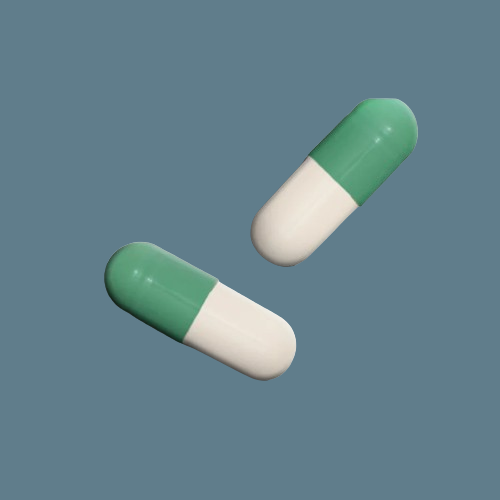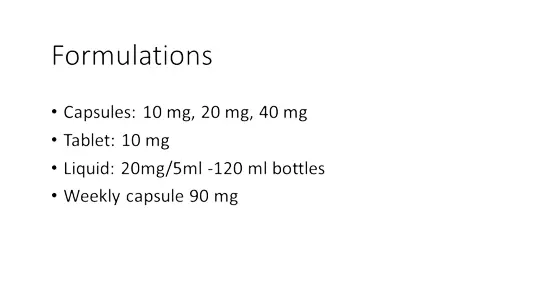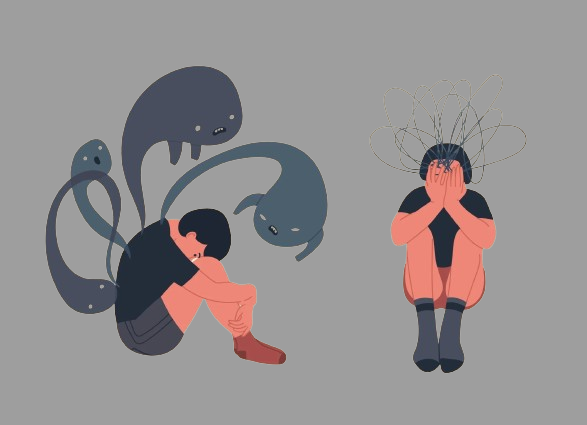One class of antidepressant called a selective serotonin reuptake inhibitor (SSRI) is fluoxetine. In addition to depression, it is occasionally used to treat bulimia and obsessive compulsive disorder.
It functions by raising serotonin levels in the brain. It is believed that serotonin positively affects mood, emotion, and sleep.
Compared to certain other antidepressants, fluoxetine has fewer adverse effects and aids in the recovery of depression in many patients.
The only way to get fluoxetine is with a prescription. It is available as a liquid that you swallow, tablets, or capsules.
What is fluoxetine?
An antidepressant known as a selective serotonin reuptake inhibitor (SSRI) is fluoxetine. Fluoxetine assists persons with symptoms of obsessive-compulsive disorder, depression, anxiety, and panic attacks by blocking the uptake of serotonin by neurons.

Prescription medication fluoxetine is used to treat major depressive disorder, panic disorder, obsessive-compulsive disorder, bulimia nervosa (an eating disorder), and premenstrual dysphoric disorder (PMDD).
Prozac functions as a selective serotonin reuptake inhibitor, or SSRI, by maintaining chemical equilibrium in the brain and preventing the absorption of the neurotransmitter serotonin. Users are able to keep a more steady and upbeat attitude as a result. Prozac can help with mood, sleep, appetite, energy levels, and lowering feelings of fear, anxiety, panic, and depression when taken as prescribed by a physician.
Prozac comes in liquid, pill, and capsule (delayed-release and long-acting) formulations and is prescribed for use in adults and children over the age of ten. It is a widely used antidepressant medication in the United States, while there are a number of other useful drugs for treating depression.
Doses of Prozac
Your doctor’s recommended dosage of Prozac will vary depending on a number of factors. Among them are:
The kind and intensity of the illness you’re taking Prozac for,
- your age,
- the health of your liver,
- And any additional medical issues you might be using additional medications.

Your doctor will usually start you on a modest dosage. They will then gradually modify it to get at the appropriate amount for you. In the end, your doctor will recommend the lowest dose necessary to get the intended result.
The suggested or frequently used dosages are described in the material that follows. Make sure, nevertheless, that you take the dosage that your physician recommends. The dosage that will work best for you will be decided by your doctor.
OCD dosage
The usual starting dose for obsessive-compulsive disorder (OCD) in adults is 20 mg daily.
Your doctor might raise your dosage if, despite treatment for a few weeks, your symptoms haven’t improved. OCD usually requires a daily dosage of 20–60 mg.
For people with OCD, the highest recommended daily dosage of Prozac is 80 mg.
Bipolar I disorder-related depression dosage
You will be prescribed Prozac along with olanzapine (Zyprexa) for depression associated with bipolar I disorder. You can get information from your doctor about the ideal dosage of olanzapine for you.

The usual beginning dose of Prozac for this purpose in adults is 20 mg daily.
Your doctor might progressively increase your dosage if your symptoms don’t go away after a few weeks. Prozac is typically taken between 20 and 50 mg daily.
Nota: Symbyax is a brand-name medication that is accessible. The active ingredient in Prozac, fluoxetine, is combined with olanzapine to create Symbyax. Generic versions of Symbyax are also available.
Depression dosage
Prozac for major depressive disorder (MDD) in adults is usually started at a dosage of 20 mg per day. Most people find that keeping up a daily dosage of 20 mg relieves the symptoms of depression. Your doctor might raise your dosage if, despite treatment, your symptoms don’t go better after a few weeks.
For MDD in adults, a daily dose of up to 80 mg of Prozac is advised.
Dosage for depression that resists therapy
You will take olanzapine (Zyprexa) along with Prozac for depression that is not responding to treatment. You can get information from your doctor about the ideal dosage of olanzapine for you.

The usual beginning dose of Prozac for this purpose in adults is 20 mg daily.
Your doctor might progressively increase your dosage if your symptoms don’t go away after a few weeks. Prozac dose for this purpose typically ranges from 20 to 50 mg per day.
Nota: Symbyax is a brand-name medication that is accessible. The active ingredient in Prozac, fluoxetine, is combined with olanzapine to create Symbyax. Generic versions of Symbyax are also available.
Dosage for eating disorders
Prozac 60 mg daily is the recommended dosage for individuals with bulimia nervosa.
Your treatment may begin with a modest dose from the beginning and be increased to 60 mg over a few days by your doctor.
You will need to take a mix of lower strength capsules to make up this dose because Prozac does not exist in a 60-mg strength. There are generic Prozac formulations available with a 60 mg dosage.
Dosage for panic disorder
Ten milligrams per day is the usual beginning dose for people with panic disorder. Your doctor will probably increase the dosage to 20 mg each day after a week.
Your doctor might raise your dosage if, despite treatment, your symptoms don’t go better after a few weeks. For panic disorder, the usual daily dosage range is 10–60 mg.
Side effects of Prozac
Prozac has been shown in clinical trials to have one or more unfavorable side effects. Even if it’s not life-threatening, if you encounter these adverse effects, consult your physician.
Typical Prozac adverse effects include:
- dysfunctional sexual behavior
- Low desire
- mouth dryness
- vomiting and nausea
- Headache
- The diarrhea
- Anxiety
- Anxiety and agitation
- increased perspiration
- Gaining or losing weight
- Lack of sleep
- Feeling sleepy
- Weary
- Shiver
- Ineffectiveness
- strange dreams
- indigestion
- flu-like symptoms
- sighing
- Sore throat or infection in the sinuses
- Warm flashes
Rare but dangerous adverse effects of Prozac include bleeding problems, convulsions, and suicidal thoughts and actions in patients.
Prozac’s harmful side effects include:
- suicidal ideas and actions
- Mania or hypomania coming on
- irregular heartbeat
- reduced ability to think, judge, and move
- unusual bleeding
- issues controlling blood sugar
- Skin rash, allergic responses, and serotonin syndrome
- issues with vision
- Convulsions
- alterations in weight or appetite
- low concentrations of sodium
The majority of fluoxetine users don’t have any significant adverse effects, despite the possibility of some unpleasant side effects include agitation, nausea, sleepiness, and anxiety.
Birth Defects, Pregnancy, and Prozac
The Prozac product label recommends pregnant women to take the medication only if the benefits to her outweigh the hazards to her unborn child. It advises against nursing if you use Prozac. In 2006, the FDA issued a warning about the possibility of fetal heart problems associated with the use of SSRIs, such as Prozac, during the latter half of pregnancy. Suicidal thoughts, violent behavior, and birth deformities have all been the cause of Prozac litigation.

Prozac has been associated with an increased risk of heart wall defects, craniosynostosis, and heart problems, according to a 2015 CDC study. These concerns were also discovered in a bigger, more recent study published in BioMed Central. There is less than 1% possibility that babies born to mothers who took SSRIs during their pregnancies will have a
Signs and symptoms fluoxetine addiction
An individual with a history of substance misuse issues may be more susceptible to developing a Prozac psychiatric dependence and addiction.
Psychological symptoms
Prozac addiction and psychological dependence may manifest as the following symptoms:
- hostile actions
- Intolerance
- difficulty sleeping
- Talking too much
- Depression
- Unease
- Delusions
- Perplexity
- Unfinished ideas
- Uncertainty
- Insanity
- suicidal ideas or actions
Behavioral symptoms
Other behavioral indicators of prescription medication abuse include:
- frequent absences from job or education
- Being fired from a job
- Self-separation
- tense connections
- Absence of interest in social activities and interests
- money issues
Withdrawal symptoms
Compared to other SSRIs, Prozac has a longer half-life, which prolongs its half-life in the body. More withdrawal symptoms will be experienced by patients who have been using Prozac for longer than by those who have recently begun taking the drug. Symptoms of Prozac withdrawal include:
- Perplexity
- Lack of sleep
- lightheadedness
- Headaches
- Changes in mood
- emesis
- Intolerance
- Aches and pains in muscles
- Weary
- memory issues
Prozac detox may necessitate expert medical and clinical care because Prozac addiction is primarily psychological in nature. During your detox, a therapist or counselor can assist you in addressing the attitudes, feelings, and ideas that led to your substance abuse. This could assist you in discovering the true cause of your Prozac addiction and creating plans to alter your thoughts and habits.
Enrolling in a detox center’s Prozac program will offer the most comfortable, safest, and successful detoxification possible. You will get psychiatric and medical attention to address the psychological problems brought on by Prozac addiction in addition to relieving any unpleasant physical side effects.



